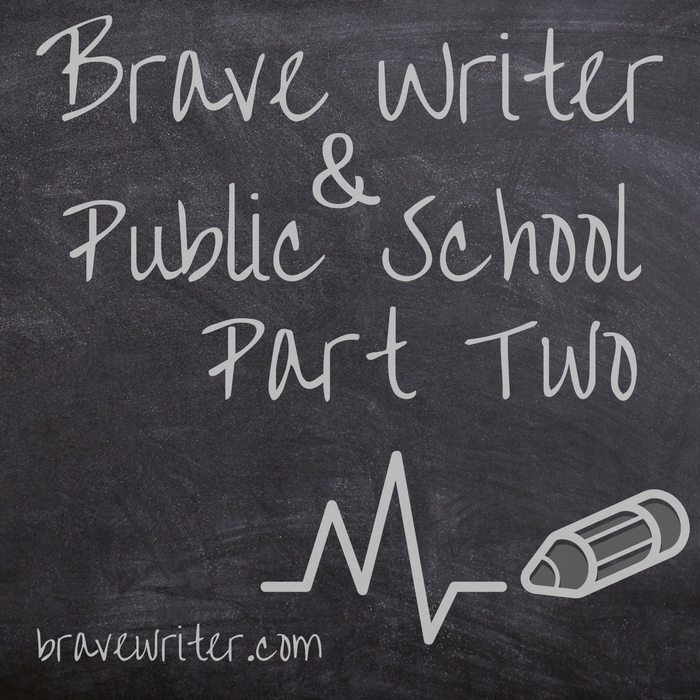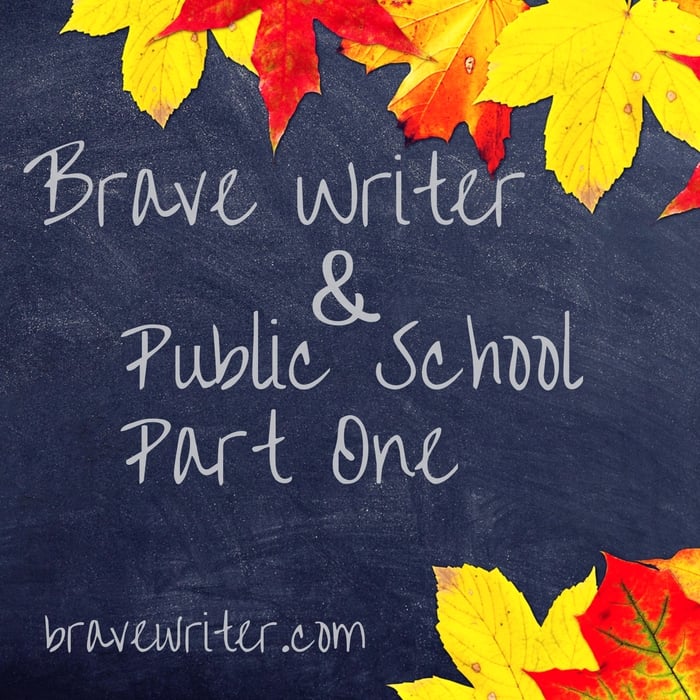
Previously, we discussed the differences between homeschool and public school.
So how can Brave Writer help your kids if they’re in school or if they are used to “school at home” (where homeschool duplicates the learning style of school with text books, workbooks and schoolish expectations)?
The important part of writing that gets overlooked (sometimes) by a school setting is the writer’s natural writing voice. While punctuation, grammar and spelling are important to the finished product of writing, these are not central to the art of writing (that process of dredging up words from the deep and getting them onto paper).
Writing has to make space for risk. Without risk, writers don’t grow. They may learn how to conform to expectations adequately, but they will not flourish as writers. What that means is that if your child is in a program at school that is squelching his or her natural writing voice, where you see writing developing into a resented subject, it’s time to intervene. Here are some practical tips for how Brave Writer can help you help your kids.
- Introduce weekly freewriting.
Freewriting is the process by which kids get to express their written ideas and thoughts without the pressure to perform to someone else’s expectations. For kids in school, the initial feeling about freewriting might be that they are sick of writing and would like a break (not more of it at home). To counteract that feeling, try freewriting in a new setting. Get out of the house, sip a hot drink and freewrite together. You can turn a weekly freewriting time into shared quality time together. Explain that this writing is meant to help the child take risks, explore his or her sense of humor, to write all the silly things he or she wants to get out but can’t in school. - Make use of the Keen Observation exercise.
You don’t need to do this one every week, but it is very beneficial a couple times a year. The purpose of the Keen Observation Excerise is to help your child see the world more closely giving it language to express what is seen. For afterschooling, this particular exercise offers your kids the chance to slow the process of writing down. Rather than producing full sentences or paragraphs, the child gives full attention to phrases and words that match his or her experience of the item being observed. This exercise then gives you a bench mark for school writing projects. How can your child recall that experience of engaged observation to convey the assignment’s topic? - Read to your kids.
There’s a tendency to think that if a child can read, that student should read to himself. Schools no longer indulge in reading to children much past age 9. You can do it differently. Rather than everyone finishing an evening together in front of the TV, select a quality work and read it a chapter at a time before bed each night. Fiction is wonderful, but don’t forget about quality non-fiction too. We’ve read books like The Wind Masters (about the flight and habits of raptors) as well as Where in the World? A Geografunny Guide to your Globe as read alouds because they were well-written and entertaining. When you read to a child, you slow the words down so that your son or daughter really hears them. You have the chance to explain processes or plot twists, you enjoy the humor, you live the story together and will naturally find connecting points in your daily life. These book experiences help your child internalize quality writing. - Go easy on school grades for writing.
Remember that elementary and junior high school grades don’t mean much in the scheme of things. Getting poor marks for spelling or handwriting says nothing about a student’s ability to write. When you read anything your child produces for school, identify what you really loved about the content and ignore any remarks on the paper about the mechanics of writing. Focus all your attention on the language (word choices) and content (what the child attempted to convey). Keep your remarks to the strictly positive. Be specific, “You know so much about hummingbirds. I didn’t know that they ____________. And how funny that you call them “Little honeysuckle suckers” because that is so much what they’re like. The words make music when I read them.” Save and share any writing your kids produce that they like with someone else (spouses make perfect audiences, but so do grandparents, aunts, uncles, close family friends).
The Writer’s Jungle is still an excellent resource for moms whose kids are in school. It helps mothers understand how to facilitate and support a child’s growth as a writer. Certainly there are additional challenges to overcome since school writing is heavy on correction and slight on meaningful praise. Your job is to shore up what the teacher fails to do. Become your child’s ally, not one more critical voice.
If you don’t know how to do that, sign up for Kidswrite Basic. This class can be done in combination with school (we’ve had several public school parents and kids in our courses over the years).




















